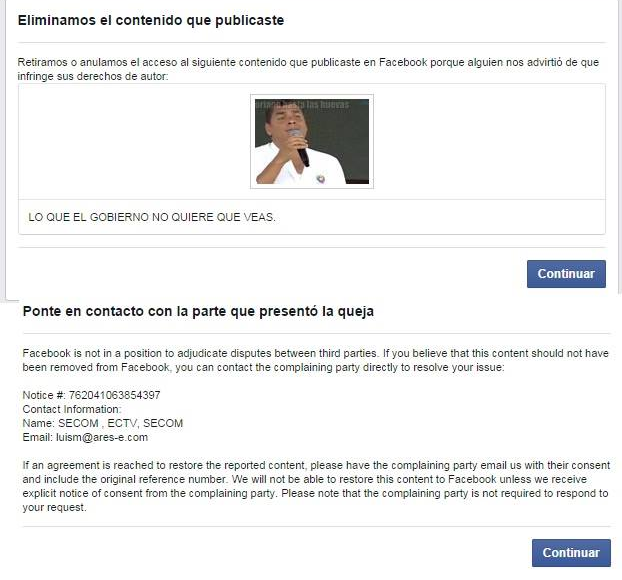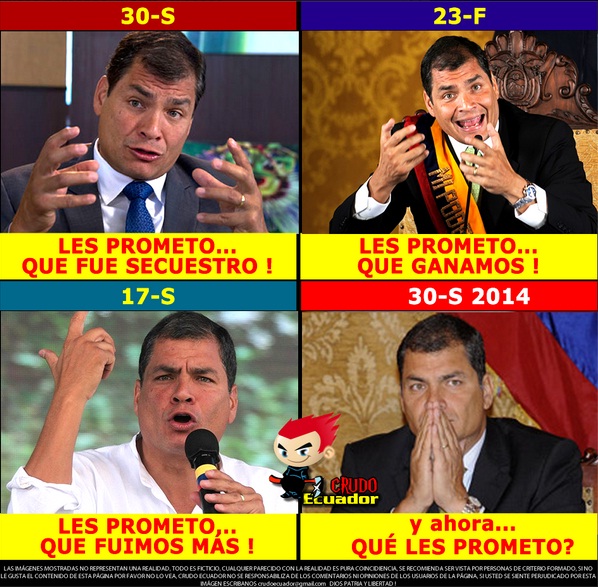EspañolThe Ecuadoran government is stepping up its censorship efforts. Now, social-media networks are subject to the same persecution that the Rafael Correa-led regime has led against more traditional media platforms.
The Correa administration has partnered with Spanish company Ares Rights in the United States, in an effort to have digital-content companies and social-media networks remove any public image of Correa or other officials from the web, through the US Digital Millennium Copyright Act.
The most recent example of this new tactic came on September 24, when Facebook removed a video titled “What Correa Doesn’t Want You to See,” which contrasts one of Correa’s speeches with images of political repression allegedly taken during September 17 and 18 protests against the president’s proposed constitutional reforms.
The video was originally published to the Ecuatoriano hasta las Huevas (Ecuadorian to the bone) Facebook Page. It was then uploaded to YouTube, where it was deleted five days after it was removed from Facebook.
Three days after being posted, the video was shared 20,000 times, and the page’s administrators claim it reached an audience of 1 million people. Then, without warning, Facebook removed the video at the request of the Secretary of Communication of Ecuador (SECOM) and Ecuador TV, on behalf of Ares Rights.
The administrator of Ecuatoriano hasta las Huevas told the PanAm Post that after posting a copy of the video on YouTube, defending the authenticity of the images, and denouncing Ares Rights’ intervention in front of thousands of followers, the social media network allowed the content to be posted.

Ares Rights has also censored videos on YouTube and Vimeo. One of these was a short documentary on Ecuadorian filmmaker Pocho Álvarez, titled Harassment of Intag, which used images of President Correa addressing the country on public television. The documentary criticized the Ecuadoran government’s efforts to pressure the Intag community to develop the mining industry in their region.
In an interview with the PanAm Post, César Ricaurte, executive director of the free-speech NGO Fundamedios, explained that approximately two years ago, the Correa regime claimed copyright over all images and speeches that appeared on Ecuadoran state television. He says Ares Rights became the acting agent of the president and the secretary of communication, with the authority to demand the removal of the alleged misused content in the United States.
Ricaurte believes this is a clear example of the ruling PAIS Alliance’s appropriation of government institutions. He also said he finds it curious that the Correa administration, who claims to oppose the United States, would use US laws to carry out their censorship.
“Ares Rights has found a way to take advantage of [US] American laws for the purpose of removing content that originated in Ecuador,” the investigative journalism outlet Plan V said in a publication that appeared on the Electronic Frontier Foundation website in May. Several days later, Ares Rights asked Plan V to remove the article because it contained a screenshot with the company’s logo, threatening to block the Plan V servers if the website did not comply.
Ricaurte agrees that the Ecuadoran government is taking advantage of US law: “Without the verification of the validity of claims before actually blocking or removing content, DMCA has a wide range of potential action. They are using the vulnerability of the law to censor content.”
A Battle Fought Every Day on Social Media

Ecuatoriano hasta las Huevas administrators claim that prior to the video’s censorship, the page had at least 100,000 fans, with an audience of at least 1 million people a week. After the attack, they only managed to regain roughly 37,000.
After the video’s removal, administrators of other Facebook pages critical of the Ecuadoran government have come out with similar complainst. They say groups affiliated with Correa have systematically coordinated their complaints against opposition Facebook pages in an effort to eliminate Facebook accounts that are critical of the president.
The administrator of one of the pages, Crude Ecuador, told the PanAm Post that a series of complaints prompted Facebook to delete his personal account, which he used to manage Crude Ecuador. He says at least three new pages have been created using the same name, but the imitators post pro-government content.
The administrators of these pages joined forces and figured out that the Facebook users that had been lodging the complaints gathered on a page called Fans of Rafael Correa. Using information published on this page, they discovered that mass complaints were being orchestrated on a very specific schedule.
To avoid the complaints, opposition groups deactivated their pages during the hours the pro-government Facebook users planned their attacks.
“Some of the administrators of these pages decided to come to together and call on our followers to help us form a group to ‘counterattack’ these troll accounts that we had identified as the leaders that promoted these attacks on our pages. After this, we were able to reactivate our pages,” the Crude Ecuador manager explained.

The administrator of another opposition page, I’m already bored of the revolution. How about you?, said pages like his, which have always been opposed to the Correa regime, are accustomed to these types of attacks. However, the harassment of more humorous pages is something completely new.
“For a long time these miscellaneous pages were more youth-based, and didn’t deal with political topics. This has changed; now, it’s not cool to be with the government. It’s quite the opposite. There is nothing less popular than the ‘Correa bourgeoise’ … This situation has led the government to create their own humorous pages that target a youth audience — to attack, threaten, or buy the pages that humorously criticize the regime’s political decisions.”
According to César Ricaurte, it has not been proven that the groups carrying out the attacks are working in concert with the Ecuadoran government. Further, the presence of SECOM and the presidency in the copyright complaints is evidence of state control.
“There needs to be solidarity networks, to speak out when there are attempts at censorship, to try to create a reaction that forces them to end the siege,” said Ricaurte. “[We need] to show them it won’t be so easy, and that there is a price to be paid when you attempt to censor.”
 Versión Español
Versión Español












